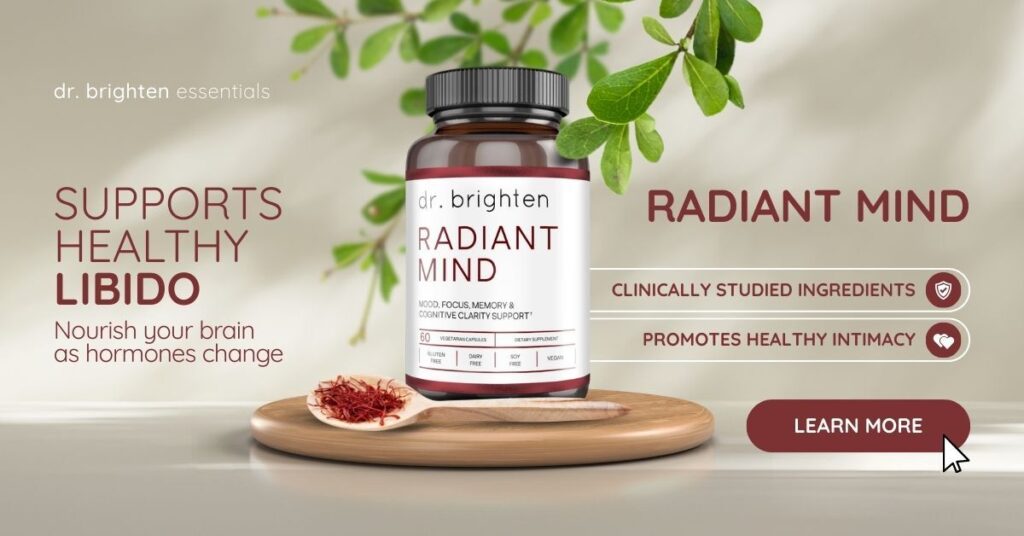Low libido is a common concern for women, especially during times of high stress, hormone shifts, or disrupted sleep. If you’ve been noticing a decline in your sexual desire or difficulty achieving orgasm, you’re not alone. Research suggests that almost 30% of pre-menopausal women and over 50% of menopausal women experience low sexual desire1.
The good news? There are natural ways to improve female libido, enhance sexual pleasure, and support your overall vitality. In this article, we’ll explore how stress management, sleep, nutrition, and specific botanicals like saffron can help restore desire and boost orgasm naturally.
Quick Summary: Natural Ways to Boost Female Libido and Enhance Orgasm
- Stress reduction: Deep breathing, daily movement, and nervous system regulation help restore desire.
- Prioritize sleep: 7–9 hours of quality sleep balances hormones like estrogen, progesterone, and testosterone.
- Body awareness: Mindful breathing and pelvic connection improve arousal and orgasm intensity.
- Nutrient-rich diet: Dark chocolate, pumpkin seeds, ginger, spinach, and asparagus support hormone balance and circulation.
Bottom line: Low female libido is common but not “normal.” By combining lifestyle shifts with evidence-based natural support like saffron, women can improve desire, pleasure, and overall sexual health.
In this article:
Why Libido Matters for Women’s Health
A healthy libido is more than just about sex — it’s a reflection of your vitality, hormone balance, and emotional wellbeing. When desire decreases, it can sometimes point to underlying issues such as:
- Hormonal changes (perimenopause, postpartum, thyroid imbalances)
- Chronic stress and elevated cortisol3
- Poor sleep and circadian rhythm disruption
- Emotional or relational stressors
- Nutrient deficiencies
- Certain medications, like anti-depressants4
Understanding the root cause is important, but simple daily practices can also reignite desire and enhance orgasm.
Natural Solutions for Low Female Libido
Low female libido can be influenced by many factors, but the encouraging news is that there are proven, natural ways to restore desire and improve orgasm. From reducing stress to adding specific libido boosting supplements for females, the following approaches can help you reconnect with your body and increase sexual satisfaction.
1. Reduce Stress to Support Desire
Chronic stress activates the sympathetic nervous system (“fight or flight”), which reduces blood flow to the sexual organs and suppresses testosterone — a key hormone for female libido.
Try This Practice:
Set an hourly reminder to pause for 10 slow belly breaths. Focus on making your exhale slightly longer than your inhale. This activates the parasympathetic nervous system (“rest and digest”), which is essential for sexual arousal and orgasm.
Daily exercise, time in nature, and even scheduling “non-sexual” intimate time with your partner can also reduce stress and restore connection.
2. Prioritize Sleep for Hormone Balance
Sleep is when your body restores and regulates key sex hormones like estrogen, progesterone, and testosterone. Poor sleep is strongly linked to low libido and reduced sexual satisfaction.
Action Step: Aim for 7–9 hours of high-quality sleep. Try to be in bed by 10 PM, keep your bedroom cool and dark, and avoid screens before bedtime to maximize melatonin production.
If you need sleep support, check out my article on the ten best sleep supplements that aren’t melatonin.
3. Reconnect With Your Body
Many women carry subconscious shame around sexuality, which can block arousal. Developing a deeper mind-body connection improves both desire and orgasm intensity.
- Practice mindful breathing into your pelvic space.
- Use visualization to release tension or negative thoughts.
- Explore gentle self-touch to learn what feels pleasurable.
This self-awareness not only improves solo intimacy but also makes it easier to communicate preferences with your partner.
4. Eat Foods That Fuel Libido
Nutrition is a powerful way to support libido by stabilizing hormones, boosting circulation, and improving energy. Try incorporating these into your daily meals:
- Dark Chocolate (70%+ cacao): Supports blood flow and dopamine release.
- Pumpkin Seeds: Rich in zinc, which supports testosterone and sexual health.
- Garlic: Contains allicin, which improves circulation.
- Bananas & Pineapple: Contain bromelain, linked to improved testosterone and anti-inflammatory effects.
- Celery: Contains androsterone, a compound that supports pheromone production.
- Spinach & Asparagus: High in folate, which supports histamine release during arousal.
- Ginger: Improves circulation and enhances sexual response.

Hormones, Nutrition, and Female Sexual Health
For many women, low desire isn’t just about stress or fatigue — it can be part of a larger picture of female sexual dysfunction, a term that describes persistent problems with desire, arousal, orgasm, or pain during sex. While emotional factors play a role, underlying physiology matters too.
Hormone Imbalance and Libido
Shifts in estrogen, progesterone, and testosterone directly influence sexual desire. That’s why many women notice menopause low libido, as natural hormone decline can reduce arousal, vaginal lubrication, and overall satisfaction. Supporting hormone balance through nutrition, stress reduction, and targeted supplements can make a measurable difference.
Aphrodisiac Foods for Women
Certain foods are considered natural “aphrodisiacs” because they support blood flow, mood, and hormone function. Dark chocolate, ginger, pumpkin seeds, and spinach are just a few aphrodisiac foods for women that also provide key nutrients linked to sexual vitality.
Vitamins for Sex Drive
Micronutrients are often overlooked, but deficiencies can contribute to low libido. Key vitamins for sex drive include:
- Vitamin D – linked to hormone regulation and mood.
- B vitamins – support energy metabolism and neurotransmitter production.
- Folate – aids histamine release, which plays a role in orgasm.
- Zinc – supports testosterone and reproductive health.
Addressing both lifestyle and nutritional gaps gives women a holistic way to support sexual health, whether low libido is due to stress, hormone changes, or female sexual dysfunction.
5. Consider Saffron for Libido and Pleasure
One of the most promising natural approaches for low female libido is saffron extract. This vibrant spice has been studied for its ability to improve both sexual desire and satisfaction.
- In women taking antidepressants, saffron supplementation significantly improved arousal and lubrication compared to placebo5.
- Additional research shows saffron helps reduce stress and improve mood, which can indirectly enhance desire6.
Saffron can be enjoyed in cooking, but clinical benefits are typically achieved with standardized supplements.
If you’re considering saffron for libido and mood support, quality and standardization matter. Many saffron supplements on the market use generic extracts or even adulterated saffron, which may not deliver the same benefits shown in clinical studies.
That’s why I created Radiant Mind, a brain and mood support formula designed for women in perimenopause, menopause, and beyond. Each capsule contains 30 mg of Affron®, a patented saffron extract that has been clinically studied to support a healthy libido.
Radiant Mind also combines saffron with Bacognize® (Bacopa monnieri), Cognizin® (Citicoline), and zinc, creating a synergistic blend that supports focus, mood, and hormone health — all of which are essential foundations for a healthy sex drive.
Learn more about Radiant Mind here.
6. Zinc: A Key Mineral for Women’s Libido
Zinc is a vital mineral for hormone balance and sexual health. It plays a key role in supporting testosterone levels, which are important for female libido. Low zinc status has been linked to reduced desire and poorer sexual function, while supplementation has been shown to improve testosterone in postmenopausal women7. Good food sources include pumpkin seeds, oysters, beef, and lentils.
Top Natural Solutions and Supplements for Women’s Libido
| Category | Specific Solution | How It Helps |
| Stress Reduction | Deep belly breathing (long exhale focus) | Activates parasympathetic nervous system; improves readiness for arousal |
| Daily exercise & movement | Boosts circulation, reduces cortisol | |
| Prioritizing Sleep | 7–9 hours nightly, dark cool room | Restores sex hormone balance; improves desire. Solutions on how to sleep better |
| Reconnecting With Your Body | Mindful breathing into pelvis | Enhances body awareness and arousal |
| Self-touch & communication | Builds sexual confidence, enhances orgasm intensity | |
| Eat Foods That Fuel Libido | Dark chocolate (70%+ cacao) | Improves vascular health, boosts dopamine |
| Pumpkin seeds | Zinc source; supports testosterone | |
| Garlic | Allicin improves blood flow | |
| Bananas & pineapple | Energy + anti-inflammatory support | |
| Celery | Androsterone may support pheromone release | |
| Ginger | Enhances circulation & sensation | |
| Spinach & asparagus | Folate supports histamine release during arousal | |
| Saffron | Standardized saffron extract (e.g., Affron®) | Improves arousal, lubrication, satisfaction |
| Supports mood & reduces stress | Indirectly enhances libido | |
| Zinc | Food sources (pumpkin seeds, oysters, beef, lentils) | Essential mineral for hormone production & sexual function |
| Supplemental zinc | Shown to improve testosterone in women with low levels |

How Your Cycle Shapes Your Libido
In my book Is This Normal, I share how a woman’s libido naturally shifts across her menstrual cycle and why that fluctuation is not only normal, but a sign of a healthy, responsive body.
When hormone levels are at their lowest, some women feel less interested in sex, while others find intimacy soothing and even pain-relieving. Conversely, when estrogen is peaking, we may find ourselves more in the mood. In the book I give you a complete guide to optimizing hormones and improving your libido. But here’s a little tip to help you get started.
How to Work With It: Instead of expecting desire to be the same every day, begin noticing your personal patterns. Journaling or using a cycle-tracking app can help you recognize when you naturally feel most connected to your sexuality. That awareness makes it easier to communicate with your partner and plan intimacy around the times you’re most receptive.
Reconnecting with yourself isn’t just about breath and mindfulness — it’s also about understanding your body’s rhythms and giving yourself permission to honor them.
Read here for more on how your menstrual cycle affects your libido.
Read more here for ways to boost your libido in perimenopause.
When to Seek Professional Support
While low libido is common, it should not be dismissed as “normal.” If natural approaches don’t restore your desire or if you have other symptoms (such as painful sex, irregular cycles, or persistent fatigue), it’s worth speaking with a healthcare provider to explore possible hormonal, thyroid, or cardiovascular causes.
Frequently Asked Questions About Female Libido and Natural Support
Natural ways to boost libido include stress reduction, quality sleep, regular exercise, mindful body awareness, and eating a nutrient-rich diet with foods like dark chocolate, pumpkin seeds, spinach, and ginger. Botanicals like saffron also show promise for supporting desire and pleasure.
Some of the most studied libido boosting supplements for females include saffron, maca root, Tribulus terrestris, ginseng, L-arginine, and zinc. Each supports sexual health through different mechanisms, from improving circulation to balancing hormones.
Supplements can be helpful, especially when low libido is related to stress, mood, or nutrient deficiencies. However, they work best when combined with healthy lifestyle habits like good sleep, exercise, and open communication with your partner. For persistent low female libido, it’s important to check for hormonal or medical causes.
Vitamins and minerals that support libido include zinc (supports testosterone), B vitamins (for energy and mood), vitamin D (linked to hormone regulation), and folate (supports histamine release during arousal).
Clinical studies suggest saffron supplementation may improve arousal and satisfaction within 4–6 weeks of consistent use. Results vary depending on the individual and whether underlying causes like hormone imbalance are addressed.
Key Takeaway
Female libido is influenced by multiple factors — hormones, stress, sleep, nutrition, and mindset. By combining simple daily practices with evidence-based botanicals like saffron, you can naturally boost desire, enhance orgasm, and feel more connected to your body.
References
- https://jamanetwork.com/journals/jamainternalmedicine/fullarticle/414363 ↩︎
- https://pmc.ncbi.nlm.nih.gov/articles/PMC9482709/ ↩︎
- https://pmc.ncbi.nlm.nih.gov/articles/PMC4199300 ↩︎
- https://pmc.ncbi.nlm.nih.gov/articles/PMC6711470 ↩︎
- https://pmc.ncbi.nlm.nih.gov/articles/PMC11060205/ ↩︎
- https://pmc.ncbi.nlm.nih.gov/articles/PMC11426294 ↩︎
- https://pubmed.ncbi.nlm.nih.gov/34311679/ ↩︎

